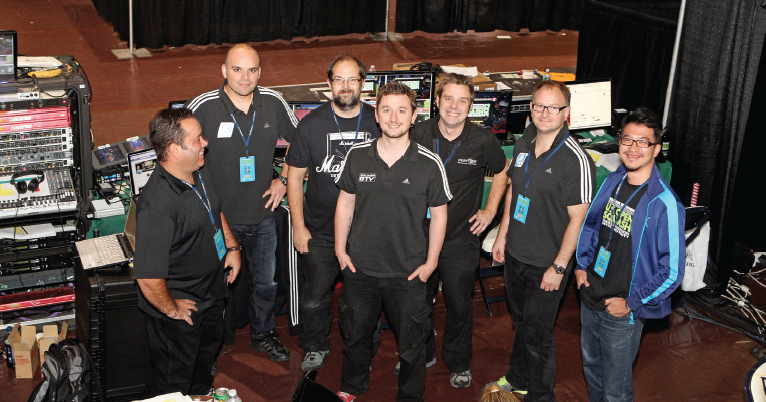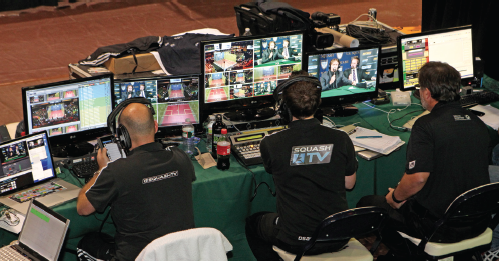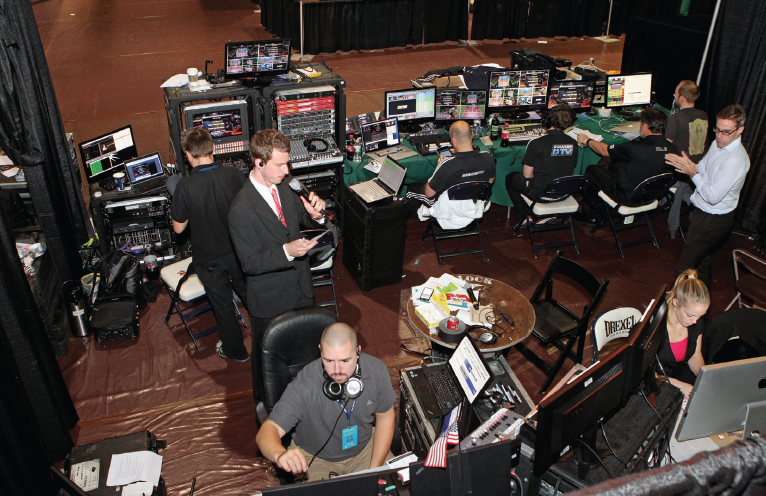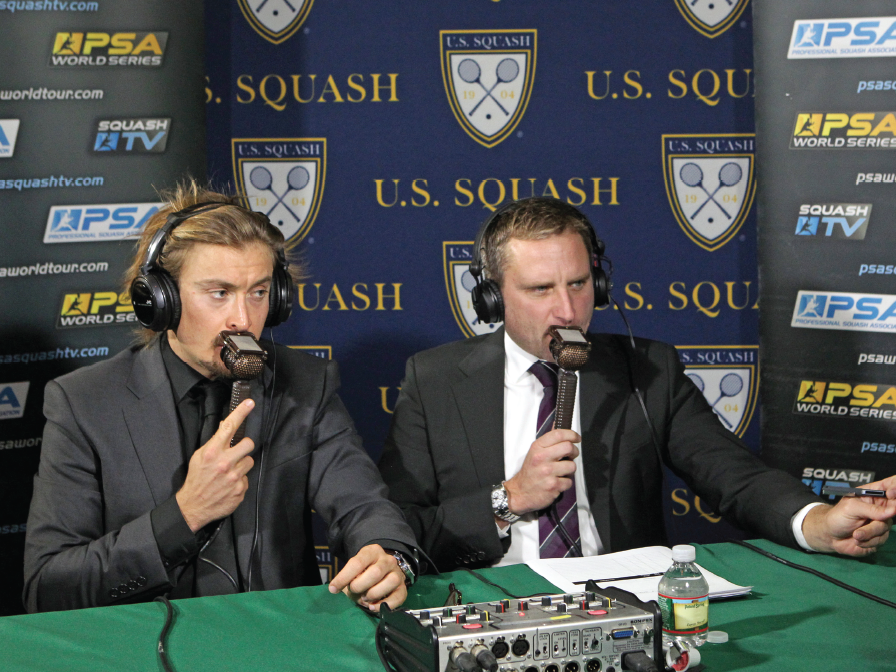
By James Zug
The inclusion of squash in the Olympic Games is an old idea. The earliest documented attempt was in 1947 for the 1952 Helsinki Games (recall that Los Angeles and Minneapolis finished tied for second in the city bidding that go around). The 1976 Montreal Games, selected in 1970, was considered a real possibility since that city had a long squash tradition—but the World Squash Federation, only founded in 1967, was a moribund organization in its early years and that effort didn’t have a realistic chance.
The first concerted push came in 1986 in Lausanne, Switzerland, to get into the 1992 Barcelona Games. Squash failed (badminton, however, did make its debut at those Games), and the rumor going around was something about how a seven-figure “donation” would have smoothed the way for squash.
Nonetheless, progress was made. In Lausanne the International Olympic Committee recognized squash as a sport, and thus the path slowly cleared for squash to join the major, quadrennial, multi-sport events: the Pan-American Games (first in 1995), World Games (1997), Commonwealth Games (1998), Asian Games (1998) and Arab Games (1999).
Every chance since, the WSF, with increasing sophistication and attention, has made an effort to join the Games. It has been topsy-turvy. The prospects looked bleak in August 2002 when the IOC placed squash on a list of sports with no right to inclusion. At the IOC Session in Singapore in July 2005, however, squash appeared— for about three hours—to go to the other extreme and make it into the Games. The Session voted out baseball and softball in the morning and in the afternoon a secret vote gave squash and karate over 50% of votes for inclusion. A second vote was needed to formally induct squash and karate onto the list of Olympic sports. But in that second vote that fateful afternoon, both sports failed to get a two-thirds majority needed: squash got 39 votes, far short of the 70 necessary for inclusion. Thus, two sports were dropped and none added for the 2012 London Games.

In the run-up for the 2016 Rio Games, squash was again on a short list that included baseball, golf, karate, roller sports, rugby sevens and softball. For the first time, the WSF hired an outside firm to help manage the bid, bringing in Scott Garrett, the CEO of KHP Consulting, a sports marketing agency that worked mostly with Formula One motor racing. George Meiras, the Scottish squash official, was the chair of the coordinating group. World Squash Day was a part of the Olympic push, as was the star of the WSF presentation to the IOC Executive Board in Lausanne in June 2009, the 13-year-old Hanna Fekede Balcha, an Ethiopian-born player at Surf City Squash (now Access Youth Academy) in San Diego.
Once again, squash failed. Golf and rugby sevens earned selection for the 2016 Rio Games. Back to the drawing board. But this time, squash made two critical decisions to give it a better shot for 2020.
Firstly, the WSF hired a sports consultant who knows the Olympics. Mike Lee, with his floppy hair, ruddy face and unsvelte physique may not look like a rock star but actually is, at least in the world of sports campaigns.
His father was a mine worker. He grew up in the northeast of England. He studied at Oxford and then worked for the Labour Party, first as a local organizer and then for a Member of Parliament, David Blunkett (who later became a cabinet minister, famous for being blind and infamous for some scandals). In 1992 Lee launched English soccer’s Premier League communication department before joining UEFA, European soccer’s governing body. In 2003 he entered the Olympic world by joining the team running the 2012 London Games campaign. After the success of that bid, Lee earned an OBE from the Queen and set up his own consulting firm, Vero. “The name is drawn from ‘veritas’ Lee said, when he came to the 2012 Delaware Investments U.S. Open at Drexel in October. “And from the concept that all great communication is based on truth.””
In six years, the truth is that Vero has had an incredible winning streak: they ran the successful Olympic bids for Rio in 2016 and Pyeongchang in 2018, they got rugby sevens selected for 2016 in Rio and they secured the soccer World Cup in 2022 for Qatar.
“I run campaigns,” Lee said. “As I watched the squash bid in 2009, I was confident the rugby sevens one was much better. Squash’s attitude was a bit of ‘we deserve it.’ This time we are pitching ‘this is why we should be picked.’ What is our story? What makes squash special? What do we offer to the Games? Answering those questions is the key.”
Squash’s narrative, according to Lee: squash is a global game with a world champion from all five IOC continents (North and South America are considered one continent in the Olympic movement) and in every multi-sport international event but the Olympics; integrating a tournament into the Olympics is easy and will showcase the host city; winning an Olympic gold medal would be the pinnacle of the game; the essence of squash—its gladiatorial nature, its athleticism—is perfect for the Games; and recent innovations make it more fan-friendly.
(The first question everyone asks Lee is about the format if squash got in: tentatively it would be 32 men and 32 women; Each nation in the top eight, based on results of the latest world team championships, would get two players in; and then one from other countries; but geographical spread would have to be considered. The point being, you don’t want to be the third best player in your country.)
Under Lee’s direction, the WSF has made campaign brochures, websites and videos (using the same video production that he used for rugby sevens), latched onto World Squash Day and social media and overall has a much more focused media message. Just watch the video from the 2009 bid and the 2012 Mike Lee one, and you’ll see a vast difference in style and substance.

Lee played a tiny bit of squash many years ago, so he is familiar with the game, and a few years ago on a whim he attended the Canary Wharf pro tournament in London. But he is decidedly not an insider. One afternoon at the Open, he and I walked into the basketball arena at Drexel. On court were James Willstrop and Alister Walker. “Who are these players?” Lee asked me. I gave their names. “Which one is Willstrop?” Lee followed up.
It was refreshing that he didn’t know the world number one. He’s not an insider. He’s an expert. That could make the difference.
The second essential part of the 2020 bid is proving that squash would enhance the Games (i.e., that it would televise well). This was the decades-old worry (the space is too small, the ball moves too fast, the players don’t look like they are working hard), and four years ago the fundamental weakness in the bid was the second-rate broadcasting of squash. Today squash looks fantastic on television and the Internet, and that fact might be the linchpin of a successful bid.
From the start of squash television broadcasting in 1959, it had been an haphazard affair, with different production teams and technological challenges. In 2004 when the PSA hired Horizon Software to stream tournaments live on the Internet, this was an enormous step towards both web and television-based broadcasting. But the PSA felt that it needed to exert greater control of the product, to make it consistently good.
In 2009 the PSA got two, thick pieces of advice. The PSA commissioned Scott Garrett and KHP to examine the world tour. One of the key suggestions in their 51-page report mirrored the IOC’s feedback from the failed bid for 2016: the PSA needed to control and develop its brand and the best way to do that was to make squash look great on television.
Lee Beachill and Alex Gough, the new leaders of the PSA, pulled the broadcast rights back and resold them, the online rights to Perform Group, based in London, for $1.5 million and the television rights to Total Sports Asia, based in Kuala Lumpur, for $600,000. Perform gets to use squash as a part of its online betting offerings; for Total Sports Asia, they have in turn resold the rights to many countries, both for live and taped broadcast.
These two contracts enabled the PSA to launch SquashTV. They had to do it entirely by the seat of their pants: rent or buy the equipment and hire staff. “We had contracted for 12 top-tier events,” recalled Gough. “That was 300 matches a year and very quickly this became a major focus for Lee and I.” The first event for SquashTV was the 2010 JP Morgan Tournament of Champions. “We hired a topnotch film director and thought this looks amazing,” Beachill remembered. “But once we went live with the semifinals, we saw that he was cutting to the wrong cameras and not using the replays right. It wasn’t what we wanted.”
As they assembled their equipment and worked out the staff, the relationship with Perform Group coalesced and eventually Perform created an OB (outside broadcast) division to handle the production of PSA events. (It has gone so well that Perform now does OB for professional darts, snooker, tennis and rugby.) Still, the PSA has spent over $1 million each of the last three years developing SquashTV. It now owns one and a half tons of equipment, which it flies, along with a permanent team, into each World Series event. The equipment is fantastic. High-definition and super-slo-motion cameras have, in the past couple of years, completely recalibrated sports broadcasting. “If we are going to get people involved and excited about squash,” Beachill said, “they need to see on their screens the sweat, the muscles, the effort our athletes are making. The technology now makes that possible.”
The broadcast team’s biggest worry is about keeping the streaming live and not getting bumped offline. A couple of times, especially in the early years, SquashTV would get bumped because of the local connection. “We have to be able to guarantee continuous coverage,” Gough said. “And now we have a fly-away satellite dish and other ways to ensure we have it.”
The dish, though, has caused a problem. Coming to Cairo for the 2010 El Gouna tournament on the Red Sea, SquashTV learned that Egyptian customs refused to release the equipment—the satellite dish made the Egyptians suspicious that SquashTV was doing more than simply broadcasting a squash tournament. They got their equipment only on the morning of the tournament. “We furiously set it up all day in the hot Egyptian sun and then did all the matches that evening,” Gough said, noting that they normally have 48 hours to set up. “That was definitely the most stressful day of SquashTV.””
SquashTV led to the new video review system which has greatly reduced another IOC bugaboo, unnecessary player dissent. “About four days before Canary Wharf in 2011, I decided we should try video review,” Beachill said. “We were already doing it all anyway. So we quickly approached the referees and wham, a whole new system is now out there.”
The team, usually nine people, is now pretty settled. The director is Mark Bousfield, graphics operator is Nev Appleton (who runs his own graphics firm MOOV TV), the engineering manager is Steve Everson, the main cameraman is John Hunter, the second cameraman (and engineer) is Rob England, the sound engineer is Jim Sefton and the replay operator and highlights editor is Laurent Cossa. Some of the guys play squash once the early days of the tournament are over and they aren’t broadcasting eight matches in a row.

The director, Mark Bousfield, is a big fan of Jack Kerouac’s lesser-known novels. He’s got tattoos, including one running down the inside of his right forearm, “Knowledge is Power” in Latin. He grew up in Wigan, went to film school in London and interned at the BBC. After school, he worked as a freelancer in sports, shopping television and video (he’s filmed many West End shows). In 2007 a short film he directed was screened at Cannes and at the Edinburgh Film Festival. He joined Perform—his first event was the Pilot Pen tennis tournament in New Haven—and his first SquashTV event was the 20011 JP Morgan Tournament of Champions (why is the ToC always the guinea pig?). “We’ve managed to stamp our boot on the game,” Bousfield said.
The major stampers are the commentators. Joey Barrington is SquashTV’s lead commentator and there are a couple of regular co-commentators: Paul Johnson and Chris Gordon in particular, but also Lee Drew and Gilly Lane (others who have tried it include Alistair Walker, Adrian Grant, Wael El Hindi, Peter Barker and Sarah FitzGerald). “We have to balance being too insidery and familiar— gossiping about our friends, using first names—and being too obvious, explaining too much,” said Barrington. “In our early years, some broadcasters wanted us to say ‘James Willstrop, in the red shirt’ every time we mentioned his name. The key thing we do for outsiders is probably explain the let and stroke calls.” A milestone for Barrington and Johnson was broadcasting the 2010 Commonwealth Games in Dehli in October 2010 for the BBC. “We were working with serious professionals and it was an incredible learning experience,” Johnson said. “We were chucked into the deep end and had to come out swimming.”
The commentators now are very professional and yet still idiosyncratic. “Lee Drew’s style is like a typical politician,” Barrington said. “He’s a fence sitter: good in the senate of Rome. PJ has terrible eye sight. He has the ability to get names wrong—a lot of malapropism. And Flash Gordon just makes up his own vocabulary, all kinds of descriptions.”
What has been a fascinating byproduct of SquashTV is the players’ reactions. “In the beginning, the players grumbled a bit about having to do interviews for SquashTV,” Bousfield said. “It was, ‘I’m here to play squash,’ But now they realize how this is at the core of expanding the game. Most of their fans, the people following them on Twitter, are people who haven’t seen them live: they are fans because of SquashTV.”
Nowadays, almost all the players go back to their hotel rooms and watch their matches. Then they complain if Barrington makes a comment about extra weight they are carrying or their mental toughness. But since they are watching, they see how they look. The biggest change is that SquashTV has inadvertently cleaned up the game. “The fishing, the blocking, the playing double bounces—it is all exposed now with the new cameras,” said Chris Gordon. “Because of SquashTV, you can’t get away with anything now.” One top 20 player even requested that SquashTV take down a replay of egregious behavior that had gone viral.
A cleaner game, a broadcast-able game, an Olympic game. Who knows? The stars might finally align in 2013.
SquashTV’s commentators, led by Joey Barrington, have come up with nicknames for many PSA players.
- James Willstrop – Marksman
- Nick Matthew – Wolf
- Ramy Ashour – Artist (though no one loves that; Barrington likes Maverick)
- Karim Darwish – Dark Prince
- Amr Shabana – Maestro
- Peter Barker – Metronome
- Gregory Gaultier – Asterix (was Psycho)
- Daryl Selby – Footballer
- Alistair Walker – Predator
- Mohammed El Shorbagy – The Barber from Alexandria
- Chris Gordon – Flash
- Tarek Momen – Viper
- Miguel Rodriguez – Columbian Cannon Ball
- Cameron Pilley – Pistol
- Omar Mossad – Hammer of Thor (for his massive forehand)
- Mohamed Ali Anwar Reda – Brawler
- Shahir Razik – Spider
- Oli Touminin – Silver Surfer
- Simon Rosner – German Treechopper
- Nickey Mueller – Swiss Rocket
- Borja Golan – Hurricane
- Aamir Atlas Khan – Prince (the singer)
- LJ Anjema – Robocop
- Abdel Gawad – Silent Assassin
- Saurav Goshal – Mogli
- Joey Barrington – Pirate





